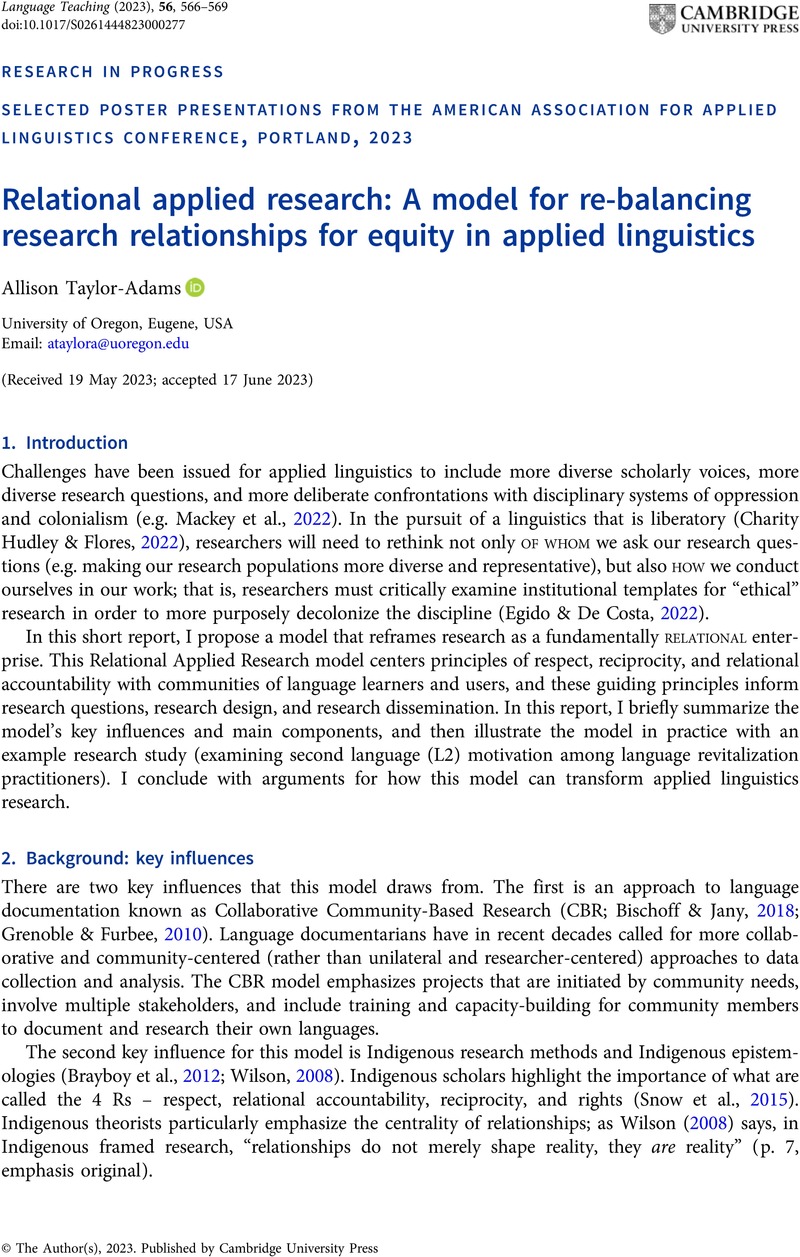No CrossRef data available.
Article contents
Relational applied research: A model for re-balancing research relationships for equity in applied linguistics
Published online by Cambridge University Press: 26 July 2023
Abstract
An abstract is not available for this content so a preview has been provided. Please use the Get access link above for information on how to access this content.

Information
- Type
- Research in Progress
- Information
- Copyright
- Copyright © The Author(s), 2023. Published by Cambridge University Press
References
Atkins, M. (2012). Strategies for an indigenous self-apprenticeship language learning program [Unpublished MA Terminal Project]. University of Oregon.Google Scholar
Bischoff, S. T., & Jany, C. (Eds.) (2018). Insights from practices in community-based research: From theory to practice around the globe. Walter de Gruyter GmbH & Co KG. doi: 10.1515/9783110527018CrossRefGoogle Scholar
Brayboy, B. M., Gough, H. R., Leonard, B., Roehl, R. F., & Solyom, J. A. (2012). Reclaiming scholarship: Critical indigenous research methodologies. In Lapan, S. D., Quartaroli, M. T., & Riemer, F. J. (Eds.), Qualitative research: An introduction to methods and design (pp. 423–450). Jossey-Bass.Google Scholar
Charity Hudley, A. H., & Flores, N. (2022). Social justice in applied linguistics: Not a conclusion, but a way forward. Annual Review of Applied Linguistics, 42, 144–154. doi:10.1017/S0267190522000083CrossRefGoogle Scholar
Czaykowska-Higgins, E., Daniels, X. D., Kulchysi, T., Paul, A., Thom, B., Twance, S. M., & Urbanczyk, S. C. (2018). Consultation, relationship and results in community-based language research. In Bischoff, S. T. & Jany, C. (Eds.), Insights from practices in community-based research (pp. 66–93). Mouton de Gruyter. doi:10.1515/9783110527018CrossRefGoogle Scholar
Egido, A., & De Costa, P. (2022). Colonial narrative of ethics in research: Telling stories and imagining decolonial futures in applied linguistics. Research Methods in Applied Linguistics, 1(2), 1–11. doi:10.1016/j.rmal.2022.100016CrossRefGoogle Scholar
Grenoble, L. A., & Furbee, N. L. (Eds.) (2010). Language documentation: Practice and values. John Benjamins North America.CrossRefGoogle Scholar
MacIntyre, P. D., Baker, S. C., & Sparling, H. (2017). Heritage passions, heritage convictions, and the rooted L2 self: Music and Gaelic language learning in Cape Breton, Nova Scotia. Modern Language Journal, 101(3), 501–516. doi:10.1111/modl.12417CrossRefGoogle Scholar
Mackey, A., Fell, E., De Jesus, F., Hall, A., & Ku, Y. (2022). Social justice in applied linguistics: Making space for new approaches and new voices. Annual Review of Applied Linguistics, 42, 1–10. doi:10.1017/S0267190522000071CrossRefGoogle Scholar
Norton, B. (2016). Identity and language learning: Back to the future. TESOL Quarterly, 50(2), 475–479. doi:10.1002/tesq.293CrossRefGoogle Scholar
Snow, K. C., Hays, D. G., Caliwagan, G., Ford, D. J. Jr., Mariotti, D., Maweu Mwendwa, J., & Scott, W. E. (2015). Guiding principles for indigenous research practices. Action Research, 14(4), 357–375. doi:10.1177/1476750315622542CrossRefGoogle Scholar
Taylor-Adams, A. (2022). L2 motivation in language revitalization practice [PhD dissertation]. University of Oregon.Google Scholar
Ushioda, E. (2020). Language learning motivation: An ethical agenda for research. Oxford University Press. doi:10.1093/applin/amab035Google Scholar
Viles, C. (2013). Dɑɑ-nɑɑ~-yɑsh/Hədiw’ [Unpublished Honors Thesis]. University of Oregon.Google Scholar
Wilson, S. (2008). Research is ceremony: Indigenous research methods. Fernwood Publishing.Google Scholar


